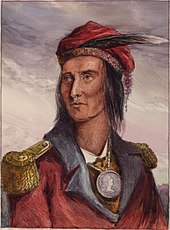rmy general
Tecumseh and Tippecanoe
Main articles: Tecumseh's War and Battle of Tippecanoe
An Indian resistance movement against U.S. expansion had been growing through the leadership of the Shawnee brothers, Tecumseh and Tenskwatawa (The Prophet). The conflict became known as Tecumseh's War. Tenskwatawa convinced the native tribes that they would be protected by the Great Spirit
and no harm could befall them if they would rise up against the white
settlers. He encouraged resistance by telling the tribes to pay white
traders only half of what they owed and to give up all the white man's
ways, including their clothing, muskets, and especially whiskey, which
was becoming known as evil for American Indians.[57]
1915 version of a depiction of Tecumseh believed to have been sketched c. 1808
Tecumseh launched an "impassioned rebuttal", but Harrison was unable to understand his language.[59] A Shawnee friendly to Harrison cocked his pistol from the sidelines to alert Harrison that Tecumseh's speech was leading to trouble. Some witnesses reported that Tecumseh was encouraging the warriors to kill Harrison. Many of the warriors began to pull their weapons, representing a substantial threat to Harrison and the town, which held a population of only 1,000. Harrison pulled his sword. Tecumseh's warriors backed down after the officers had pulled their firearms in defense of Harrison.[59] Chief Winnemac, who was friendly to Harrison, countered Tecumseh's arguments and told the warriors that since they had come in peace, they should return home in peace. Before leaving, Tecumseh informed Harrison that unless the treaty were nullified, he would seek an alliance with the British.[60] After the meeting, Tecumseh journeyed to meet with many of the tribes in the region, hoping to create a confederation to battle the United States.[61]
In 1811, while Tecumseh was traveling, Harrison was authorized by Secretary of War William Eustis to march against the nascent confederation as a show of force. Harrison led an army of more than 1,000 men north to try to intimidate the Shawnee into making peace. Instead, the tribes launched a surprise attack on Harrison's army early on the morning of November 7, in what became known as the Battle of Tippecanoe. Harrison defeated the tribal forces at Prophetstown, next to the Wabash and Tippecanoe Rivers. Harrison was hailed as a national hero and the battle became famous. However, his troops had greatly outnumbered the attackers, and suffered many more casualties during the battle.[62]
When reporting to Secretary Eustis, Harrison informed him the battle occurred near the Tippecanoe River (which led to its naming), and he feared an imminent reprisal attack. The first dispatch did not make clear which side had won the conflict, and the secretary at first interpreted it as a defeat. The follow-up dispatch made the US victory clear. When no second attack came, the defeat of the Shawnee was more certain. Eustis demanded to know why Harrison had not taken adequate precautions in fortifying his camp against attacks. Harrison countered by saying he had considered the position strong enough. The dispute was the catalyst of a disagreement between Harrison and the Department of War that continued into the War of 1812.[63]
The press did not cover the battle at first, and one Ohio paper misinterpreted Harrison's dispatch to Eustis to mean he was defeated.[64] By December, as most major American papers carried stories on the battle, public outrage over the Shawnee attack grew. At a time of high tensions with the United Kingdom, many Americans blamed the British for inciting the tribes to violence and supplying them with firearms. In response, Congress passed resolutions condemning the British for interfering in American domestic affairs. A few months later, on June 18, 1812, the U.S. government declared war against United Kingdom.[65] Shortly thereafter, Harrison left Vincennes to seek a military appointment.[66]

No comments:
Post a Comment